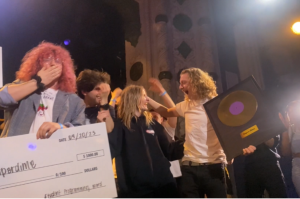With two restaurants located in the city, Uncommon Ground’s unique focus on fresh and organic goes from the food served to hungry customers to the rooftop farm that makes it an eco-friendly trailblazer.
Uncommon Ground’s eatery at 1401 W. Devon is the first restaurant in the country to have a certified organic rooftop farm.
Helen Cameron, owner of Uncommon Ground, said the Midwest Organic Services Association (MOSA) officially certified the farm in October 2008.
“Everything is done organically. All the imports are organic, and we are very dedicated to that process because I do not want to consume any herbicides, pesticides… anything I bring into the restaurant that is really not right,” said Cameron, as she ordered a cup of squash soup.
Cameron said the goal at the restaurant is to serve food “when it is at its peak, fresh and when it hasn’t been transported 2,000 miles.”
Cameron said she also wants to offer great hospitality, warmth, good food, good drinks, music and art.
“It all started 19 years ago at Clark and Grace in a tiny little 800-square-foot spot with me and my husband Michael,” said Cameron.
Cameron said she has always appreciated good food and that’s what pushed her into becoming a chef. For 15 years, she worked in the kitchen and helped to grow Uncommon Ground at Clark and Grace.
When the Camerons decided to open a second restaurant, they wanted to be able to own the building.
“When we found this place, it could not have been more ideal for what we were hoping to do here. It actually added so [many] more possibilities because we had this parking lot, and then we realized we had the roof,” said Cameron. “It was pretty much the idea of a farm right from the beginning.” The option of people dining on the roof was never seriously considered, she said, as the focus all along was “to really produce food.”
Cameron said she and her husband are using the rooftop farm as a testing ground to figure out the best way to produce food on a rooftop.
“We designed it, got help from the organic gardener, and had to have a structural engineer. It took some major doing to get it set up because there is a lot of weight up there, and it is very important to make sure that your structure can handle that type of weight,” Cameron said as she dipped the bread into her soup.
She explained that she fortified all the building’s bearing walls with big cement footers and exchanged the wood bearing beams with steel I-beams.
“Our entire farm is floating above the roof, and it is supported by steel,” said Cameron.
The deck is 2,500 square feet.
“The growing space is just under 700 square feet, which comes to about .015 acres,” said Cameron.
Cameron said the farm is trying to use heirloom varieties of vegetables, because it is important to preserve bio-diversity.
“I fully expect things to be an experiment for at least five years before we can settle in and really develop a farming pattern that works for us,” said Cameron.
Natalie Pfister has been the farm director at Uncommon Ground since September 2008.
“We grow lots of veggies and herbs. Mostly tomatoes, a lot of heirloom varieties, including Zapotec Pleated, Japanese Black Trifle and Prize of the Trails,” said Pfister.
The farm also grows cucumbers, squash, eggplant, lettuces, onions, garlic, corn, beans, peas, radishes, carrots, beets, basil, thyme, cilantro, parsley, rosemary, oregano, lemon balm and a lot of edible flowers.
“Our menu changes every week, either a day or night menu. The changes that we make reflect the season and what is available to us as locally as we can get it. So, basically we gear the menu toward what is available nearby,” said Cameron.
Customer Gannon Reedy, a junior at Columbia College Chicago, has nothing but good things to say about Uncommon Ground.
“I have been there three or four times, and the few things that I have had there were pretty killer,” said Reedy. “It’s quite expensive, but definitely worth the extra bucks. You get what you pay for.”
“The good food element, and buying food that has been raised sustainably or organically, is really important to me as a chef because the flavor is better, and the nutrition is better,” said Cameron, as she smiled at a mother and her young son who were seated by the fireplace.
“I think that when you are born, you are a natural gardener. We designed the farm thinking a lot of kids would be up there. It is very user friendly space, so it’s accessible to kids and also very easy for us to move around in there and work in there as well,” said Cameron.
According to its website, Uncommon Ground teaches urban agriculture classes to nearby Waldorf School’s third graders. In addition, the business has a weekly farmers market, hosts green room sessions and once a month holds an eco-mixer hosted by local green organizations to develop opportunities for networking and growing a sustainable community.
“Helen and Mike started to do green room sessions to bring community members together with local organizations,” said Pfister.
Last year Uncommon Ground began to use themes during the green room sessions, including alternative transportation, urban agriculture, kids green and gardening, and sponsored events by community partners,” said Pfister. The sessions are offered every second Thursday of the month.
“The market is a real big community connector,” said Cameron.
Brittany Eisner has been the manager of Uncommon Ground for six months.
“We have a lot going on here. We are more than just food. We try to get the community involved, especially in the neighborhood,” said Eisner.
Cameron is working for her certification from the Green Restaurant Association (GRA).
Kate McGovern of the Green Restaurant Association, based in Boston, said that the association prides itself on having the world’s largest database of green solutions for the restaurant industry.
“We have a point system that we work with. All of our standards are online, so it is very transparent, and that way when the restaurants come on board they know exactly what we look at,” said McGovern.
There are seven different environmental categories: Sustainable Food, Waste Reduction and Recycling, Water Efficiency, Sustainable Furnishings and Building Materials, Energy, Disposables, and Chemical and Pollution Reduction.
Cameron said there are some areas her restaurant really excels at and others that they need to take a closer look at.
“We recycle everything, and that’s a big deal. We also have thermal solar panels, which heat our water,” said Cameron. “What’s great about doing this is that it’s really providing me an education.”
Cameron also said that art and music are a big part of what they do.
Not only does Uncommon Ground have daily live music, it also has artwork that can be purchased.
“It is a community that I really support, and it is important that art stays in our world,” said Cameron.
One of her goals is to help others learn to do rooftop farming and grow food in the city. Cameron said she wants to “pass it along and be open to helping other people do what we are doing.”















Be First to Comment